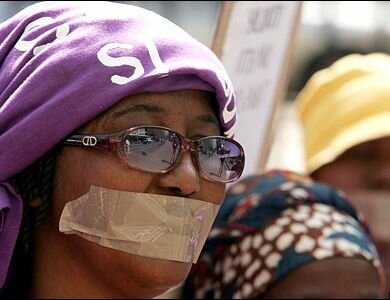I do not consent: Musings on sexual terrorism
Women — By Jo Nubian on January 11, 2010 at 07:00I am the history of rape
I am the history of the rejection of who I am
I am the history of the terrorized incarceration of myself
I am the history of battery assault and limitless
armies against whatever I want to do with my mind
and my body and my soul and
whether it’s about walking out at night
or whether it’s about the love that I feel or
whether it’s about the sanctity of my vagina or
the sanctity of my national boundaries
or the sanctity of my leaders or the sanctity
of each and every desire
that I know from my personal and idiosyncratic
and indisputably single and singular heart
I have been rapedFrom A Poem About My Rights by – June Jordan
I have been steadily dodging the writing of this blogpost, however the words you are reading haunt me. I would like to say that my thoughts about rape began just a few months back, but this would be a lie. As a woman, and especially a Black woman, unkept and unsafe, the threat of rape is almost as constant as breathing and books. What I will say is that rape has been at the forefront of my thoughts since POTUS Obama was awarded the Nobel Peace Prize, which may seem odd, although it is not. Once the announcement was made, I became curious to see who else had been nominated. I consider myself solution oriented and felt that if I would denounce my support of the committee’s choice, I certainly would need to provide the name of a more deserving victor.
As I searched the list and read the stories, one name in particular was familiar to me, although unfortunately not in cheer. It was Dr. Denis Mukwege, a Congolese gynecologist, who has dedicated his life to treating the women of DRC who are the victims of rapes so brutal that I would need an entirely separate blogpost to describe them. Dr. Mukwege’s hospital is overrun with battered, tortured, mutilated women, whose only offense in this world is being born into it. In one province alone, over 27,000 rapes were reported, which accounts for at least 70% of the women living there. While addressing the US Senate last year Dr. Mukwege made the following statement, that has etched it’s way into my memory much like my favorite lovers or Baldwin quotes, “It is important to point out that this sexual terrorism is done in a methodical manner”. It had never occurred to me previously to describe rape as terrorist or methodical, but therein lies the truth of it.
Moving forward in time, again my thoughts and heart are bombarded with the ugliness of rape after reading an article about a fifteen year old girl being gang raped by five boys as more than twenty people spectated. My blood boiled so terribly that I assumed it was fever and that this world had been successful in literally making me sick. And as I spoke about the incident on twitter, I began to receive all of these private messages from women who had been victims of gang rapes themselves. I didn’t want to believe that such violence against women was so prevalent, so commonplace. Subsequently, the days and nights following the details of that rape were exhausting. Thoughts of my and my daughter’s safety began to eat away at my sleeping hours, and I kept wanting to embrace all of the women who contacted me, somehow allowing my love to spill through my pores, providing protection where others had failed them. Yes rape is terrible and a terror, even for those women not raped.
Rape is terrorism, especially if one defines terrorism as, “the use of violence and threats to intimidate or coerce”. Certainly, there is no stronger example that one could present to contest an individual’s (and possibly a group’s) humanity than a publicly viewed rape and torture, as were the cases in the Congo and in California. Suddenly there did not seem to be so much distance between the US and the DRC. Consequently, as tragic as these rapes are we cannot afford to limit our anger and remorse to these specific cases of abuse. Sexual violence against women also includes sexual harassment/extortion, spousal abuse, incest and child rape (May peace be upon Shaniya Davis), forced sterilizations, and an overall inability to choose, as a woman, what happens to one’s body. My revolutionary crush, Angela Davis, agrees, which I noted while reading an address she presented at Florida State University in 1985 entitled, We Do Not Consent: Violence Against Women in a Racist Society. She writes:
These particular manifestations of violence against women are situated on a larger continuum of socially inflicted violence, which includes concerted, systematic violations of women’s economic and political rights. As has been the case throughout history, these attacks most gravely affect women of color than their white working-class sisters. The dreadful rape epidemic of our times, which has become so widespread that one out of every three women in this country can expect to be raped at some point during her life, grimly mirrors the deteriorating economic and social status of women today.
If we disconnect rape, and consequently, all sexual violence against women, from their socio-economic foundations, we cannot adequately discuss solutions to said abuses. We dis-serve women by only acting or objecting to sexual abuse in extreme cases. We have to understand that a woman should control her reproduction, or desired lack thereof- and be allowed to do so safely and with no judgment. We must admit that, no matter how “provocatively” dressed or sexually explicit a woman appears to be, we have no right to objectify her and/or harass her. We cannot emotionally abuse women, use women, treat them as receptacles, even if they contend that such treatment is okay, because we know that it is not. We have to sincerely view women as human beings before we can wholeheartedly respect and protect them.
There is no truth but this.
Please read the rest of June Jordan’s poem A Poem About My Rights here:
To truly understand the intersection of race, class and gender, please read Angela Y Davis’ Women, Culture and Politics
More on Dr. Denis Mukwege and his mission.
Tags: abuse, black women, Obama, sexual terrorism, WomenAuthor: Jo Nubian (12 Articles)
Jo Nubian is a freelance writer whose writing focuses on human rights, especially issues of race and gender. She is currently based in Houston, Texas where she is completing her masters of arts in literature and writing for various journals, magazines, and other publications. Her thesis work discusses the theme of womanism in the life and works of Zora Neale Hurston.



 Share This
Share This Tweet This
Tweet This Digg This
Digg This Save to delicious
Save to delicious Stumble it
Stumble it





 Fresh talking point: Poor Afghanistan, they're rich!
Fresh talking point: Poor Afghanistan, they're rich! Precious... Really?
Precious... Really?







